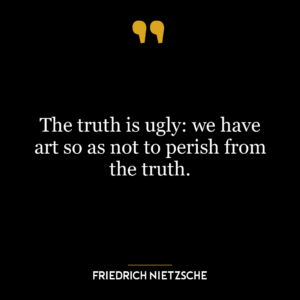This quote suggests that goodness, according to Nietzsche, is anything that amplifies the sense of power, the desire for power, and power itself within an individual. It implies that power is not just about control over others but also about self-empowerment and self-mastery. This perspective views power as a driving force for growth, development, and achievement, and it is this pursuit and attainment of power that is considered ‘good.’
The concept of ‘will to power’ is central here. It is not just the possession of power but the will, the desire, the drive to seek power that is deemed as good. This ‘will’ represents an individual’s inner strength, ambition, and determination to overcome obstacles, to strive for improvement, and to achieve goals.
In today’s world, this idea can be applied in various ways. In personal development, for instance, the ‘feeling of power’ could be interpreted as self-confidence or self-efficacy. The ‘will to power’ could represent the motivation or desire to improve oneself, learn new skills, or achieve personal goals. ‘Power itself’ could symbolize personal achievements or the attainment of desired skills or goals.
For example, someone might feel a sense of power when they master a new skill, like public speaking or coding. The will to power is the force that drives them to practice, to face their fears or challenges, and to improve. When they finally deliver a successful speech or create a functional software, they have realized their power—they have made their will to power a reality.
In a broader societal context, this idea could be applied to social movements or initiatives that aim to empower individuals or communities. The ‘good’ in these movements is the empowerment they bring—the sense of power they instill in individuals, the will to power they inspire, and the actual power (in terms of rights, opportunities, or resources) they help individuals or communities attain.
However, it’s important to remember that Nietzsche’s idea of power must be balanced with ethical considerations. Power, in its raw form, can lead to domination or exploitation if not tempered with empathy, respect for others, and a sense of social responsibility.













